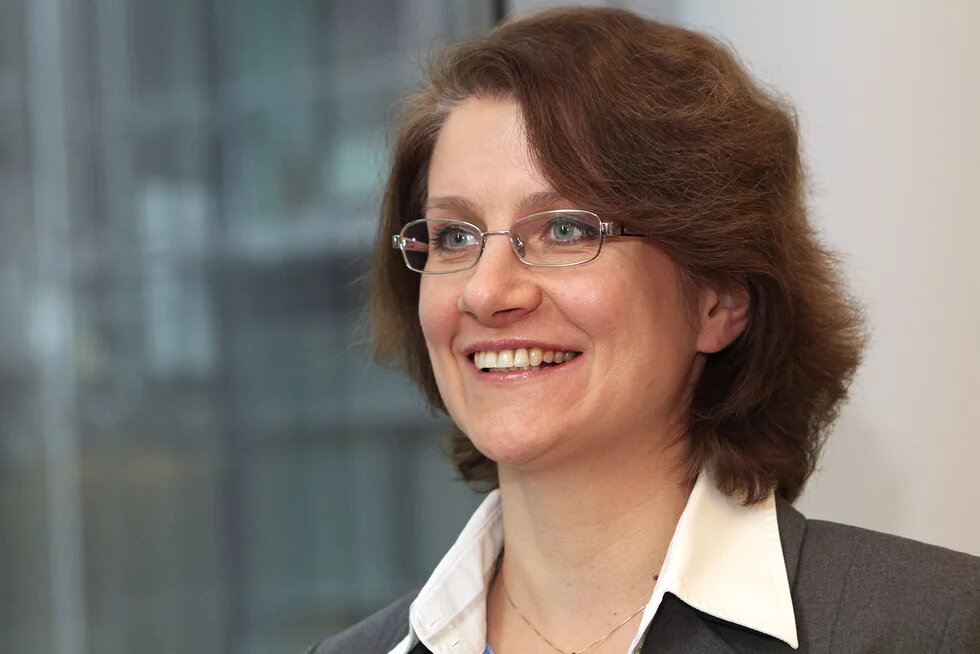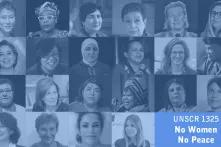The stamina of women who actively care for their relatives who have been missing for years inspired Rasa Ostrauskaite in her work for a more sustainable missing persons process in Iraq.

This piece is part of our dossier "No Women - No Peace: 20th Anniversary of UNSC Resolution 1325 on Women, Peace and Security".
‘I am inspired by so many women I have encountered in local communities in Ukraine, Georgia and Iraq who selflessly fight for a cause, despite very challenging contexts and modest means’, says Rasa Ostrauskaite, who was Head of International Commission on Missing Persons (ICMP) Mission in Iraq until September 2020.
‘They may not have a university degree or great speaking skills, but they have the energy and the stamina and are able to bring people together and turn particular ideas into reality. In Georgia, I have met inspiring community leaders who work across the conflict lines. Most recently in Iraq, I have encountered many women that years after their loved ones went missing, they keep actively looking for them– such stamina and idealism inspire me!’
Two decades ago, Ostrauskaite was amongst the organisers of a major United Nations (UN) conference on women’s issues, and several months after this the UN adopted Security Council Resolution 1325 on women and peace and security. Although a lot still remains to be done, but at least the subject has become a mainstream discourse. Still, Ostrauskaite works in an environment where women have to prove that they are worth speaking with.
From a student of sociology to a diplomat
In the 1990s, Ostrauskaite studied sociology and had the ambition of becoming an academic researcher, but then she got a chance to do an internship at the Permanent Mission of Lithuania to the United Nations in New York. ‘I enjoyed my internship so much that I thought as soon as I finish my studies and have the diploma in my hands, I will join the ranks of diplomats’, she recalls.
The young Ostrauskaite joined the diplomatic service of Lithuania. Once the country became a member of the European Union (EU) in 2004, she joined the Council of the EU where she served in various capacities in/on post-conflict countries. Five years later, Ostrauskaite joined the Organization for Security and Co-operation in Europe (OSCE) headquartered in Vienna. Whilst with the OSCE, she was recognized as a gender champion for supporting numerous innovative gender-mainstreaming projects in the area of combatting transnational threats. In September 2019, she became Head of ICMP Mission in Iraq. At the time, she had received two offers: a post in The Hague and Baghdad, but to everyone's surprise she chose Baghdad. It was not an accidental decision: Ostrauskaite wanted to contribute to addressing the problem of missing persons. There was also a personal consideration: Rasa’s grandfather was deported by the Soviets to Siberia and had never returned to Lithuania.
‘I thought I had been dealing with (post-)conflict settings throughout my career, in Bosnia and Herzegovina, Georgia, Nagorno-Karabakh, and eastern Ukraine but I had never worked in the Middle East. The ICMP seemed to be a very interesting organization with a noble mission. Home to some earliest known civilizations, Iraq is an immensely interesting country with a vast cultural heritage. But it is also a country which is affected by very high numbers of missing persons, with so many families suffering the anguish of uncertainty regarding the fate of their loved ones.’
It pays off to go local
Many analysts compare Iraq’s current situation to a ‘perfect storm’. In fact, Iraq faces a great number of issues: continued political divisions, popular civil protests, rising tensions between the US and Iran continue to have an impact on Iraq, budgetary crisis partly caused by the recent crash in international oil prices, and the recent outbreak of COVID-19.
‘Security incidents continue to dominate the headlines of local press. ISIS [the so-called Islamic State] has begun to reassert itself in Syria and Iraq, mounting increasingly bold insurgent attacks. So the security situation remains challenging.’ Yet the nature of ICMP work requires frequent travel throughout the country.
Security is traditionally considered to be a male-dominated territory. So it’s no wonder that Ostrauskaite has been asked many times: What are you doing here? Going local and blending in have paid off: ‘my best investment in Iraq has been an abaya’, Ostrauskaite laughingly notes. An abaya (literally meaning a cloak) is a robe-like dress that covers the whole body except the head, feet and hands.
‘I would put on an abaya when visiting most conservative local communities. In some meetings, I might be the only European. But if I am in abaya, even the more conservative religious or community leaders agree to receive me.
‘Huge effort to trace down enormous crimes’
ICMP team in Iraq consists of 20 experts. They assist the Iraqi authorities in excavating mass graves - a legacy of Saddam Hussein's rule or ISIS. Estimates run that there are from 250,000 to one million persons missing in Iraq from decades of conflict and human rights abuse including missing persons from the Ba’ath regime, the Iran/Iraq war, the Gulf Wars, as well as those missing since 2003.
‘There are hundreds of mass graves in Iraq. We work very closely with the Iraqi national team, consult them on various technical and legal aspects of a sustainable missing persons process...’ The process of locating and identifying missing persons is extremely complex, painfully long and requires a lot of specialized expertise from forensic anthropology and archaeology to DNA extraction and matching.
‘It is a standard to consider issues of women and peace and security’
This year, we celebrate the twentieth anniversary of the UN Security Council Resolution 1325 that reaffirms the important role of women in the prevention and resolution of conflicts, peacekeeping, peace-building and post-conflict reconstruction. Has a lot changed in the last two decades in terms of women and peace and security? Ostrauskaite’s answer is ‘yes, I think so’.
‘I have been working on this issue in one way or another for a long time. Has anything changed? Yes, but progress has been uneven. The number of women negotiators or women peacekeepers continue to remain rather low, but the importance of women’s participation in peace processes is no longer questioned. There is a myriad of local initiatives successfully spearheaded by female community leaders. The growing number of female heads of state and government launch and support local and regional women’s initiatives. “Nothing about us without us” has gained momentum.’
As the COVID-19 pandemic continues to escalate, Ostrauskaite is very concerned about the coronavirus backlash with so many women bearing the brunt of the economic fallout. ‘We speak a lot about opportunities for women, the heads of states and governments and ministers quote Resolution 1325, often in the form of normative statements. I would like to see those normative statements implemented! Actions speak louder than words.’
Having worked as Head of International Commission on Missing Persons (ICMP) Mission in Iraq for one year, Rasa Ostrauskaite became EU-Ambassador to the Organization for Security and Co-operation in Europe (OSCE) as of September 2020.


